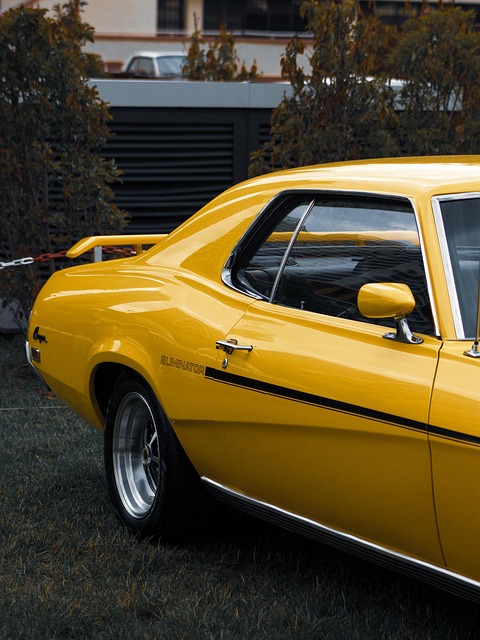Looking to register your car in California? This guide walks you through the entire process, ensuring a smooth experience. First, understand the eligibility requirements for car registration in the Golden State. Then, gather all necessary documents for your DMV visit, including proof of ownership and insurance. Next, perform a dmv VIN verification to ensure your vehicle’s authenticity. Complete the application, pay the registration fees, and receive your new license plate and proof of registration.
- Understand Eligibility Requirements for Car Registration
- Gather Necessary Documents for DMV Visit
- Perform Vehicle Identification Number (VIN) Verification
- Complete Application and Pay Registration Fees
- Receive Plate and Proof of Registration
Understand Eligibility Requirements for Car Registration

Before diving into the registration process, it’s crucial to understand the eligibility requirements set by California’s Department of Motor Vehicles (DMV). To register your car in California, the vehicle must meet specific criteria. It should be properly insured and have a valid inspection certificate, ensuring it complies with safety and emissions standards. The DMV also requires a completed registration application along with necessary fees. One essential step is the VIN (Vehicle Identification Number) verification process, which can typically be done online or through a mobile vin verification service.
Additionally, you’ll need to provide proof of ownership, such as a title document, and ensure that any liens on the vehicle are correctly noted. A clean title, often obtained through a title transfer or replacement, is generally required. The process may vary slightly depending on whether you’re registering a new or used car, so it’s important to check with the DMV for the most accurate and up-to-date information. Consider utilizing a mobile vin inspection service for added convenience during this crucial step of the registration procedure.
Gather Necessary Documents for DMV Visit

Before visiting your local California DMV, ensure you have all the essential documents ready. This process is crucial for a smooth registration experience. You’ll need to bring along the vehicle’s title, which proves ownership, and a valid driver’s license or ID card. Additionally, the DMV will require proof of insurance and a completed application form for vehicle registration.
A dmv vin verification is another critical step in this process. This involves checking the Vehicle Identification Number (VIN) to ensure the car’s history aligns with the information provided. For convenience, many individuals opt for a mobile vin verifier or even conduct a mobile vin inspection before their DMV visit to save time and avoid potential delays.
Perform Vehicle Identification Number (VIN) Verification

Before proceeding with the registration process, it’s crucial to perform a Vehicle Identification Number (VIN) verification. This step is essential as it ensures that your car’s details match the information provided by the manufacturer. The California Department of Motor Vehicles (DMV) recommends using a mobile VIN verifier or conducting a mobile VIN inspection to cross-reference the VIN with official records, ensuring accuracy in the registration process.
A mobile VIN verification service can be particularly convenient, allowing you to check your vehicle’s history quickly and efficiently from the comfort of your home or even while at a local DMV office. By verifying the VIN, you’ll have peace of mind knowing that all the necessary information is correct, saving time and preventing potential issues during registration.
Complete Application and Pay Registration Fees

To begin the registration process in California, start by obtaining an Application for Title and Registration (Form DVW-140). Fill it out completely, ensuring all required information is accurate and up-to-date. This includes your personal details, vehicle specifications, and the Vehicle Identification Number (VIN) which can be quickly verified through a DMV vin verification or using a mobile vin verifier. Once you’ve completed the form, submit it along with the necessary documents and fees to a California Department of Motor Vehicles (DMV) office.
The registration fees vary based on your vehicle’s type and age. You can pay these by cash, check, or credit card. After processing your application, the DMV will issue you a registration certificate, which is typically valid for 3 years. Remember, timely renewal is essential to avoid penalties. For convenience, many residents opt for a mobile vin inspection service that streamlines the initial verification process and ensures a smoother registration experience.
Receive Plate and Proof of Registration

After submitting your application for vehicle registration at the California DMV, you’ll receive a temporary registration card and license plate. This initial step marks a significant progress in the process of registering your car. Before hitting the road, ensure that you have both items securely in hand. The temporary registration card serves as proof that your vehicle is legally authorized to be driven within the state during the interim period.
Simultaneously, you’ll also obtain Proof of Registration, which includes vital details about your vehicle, including its unique Vehicle Identification Number (VIN). It’s crucial to keep this document secure. For added convenience and accuracy, consider using a mobile VIN verifier or conducting a vin inspection to verify your car’s information directly from your smartphone. This step ensures that all data associated with your vehicle is correct and up-to-date, further reinforcing the legitimacy of your registration.
Registering a car in California is a straightforward process that requires understanding the eligibility criteria, gathering essential documents, and completing a few key steps. After ensuring your vehicle’s compliance through a mandatory DMV VIN verification, you can submit your application, pay the registration fees, and receive your new license plate and proof of registration. This simple guide makes navigating the car registration process in California easier for both first-time and experienced vehicle owners.



